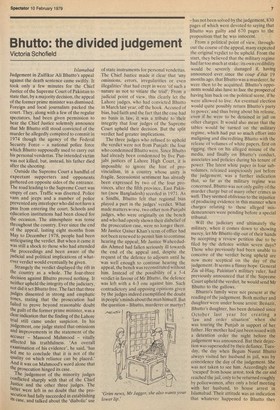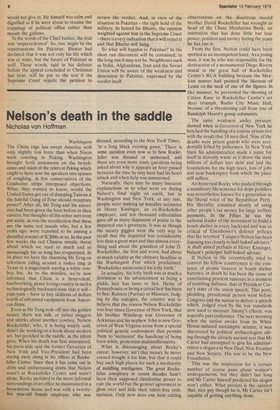Bhutto: the divided judgement
Victoria Schofield
Islamabad Judgement in Zulfikar Ali Bhutto's appeal against the death sentence came swiftly. It took only a few minutes for the Chief Justice of the Supreme Court of Pakistan to state that, by a majority decision, the appeal of the former prime minister was dismissed. Foreign and local journalists packed the court. They, along with a few of the regular spectators, had been given permission to hear the Chief Justice solemnly announce that Mr Bhutto still stood convicted of the murder he allegedly conspired to commit in 1974 though the agency of the Federal Security Force — a national police force which Bhutto supposedly used to carry out his personal vendettas. The intended victim was not killed, but, instead, his father died after the shooting.
Outside the Supreme Court a handful of expectant supporters and opponents gathered on opposite sides of the entrance. The road leading to the Supreme Court was empty of cars. Traffic was diverted. Police vans and jeeps and a number of police prevented any interloper who did not have a pass from entering the court. Schools and education institutions had been closed for the occasion. The atmosphere was tense throughout the country. Ever since the end of the appeal, lasting eight months from May to December 1978, people had been anticipating the verdict. But when it came it was still a shock to those who had attended the proceedings and been aware of the Judicial and political implications of whatever verdict would eventually be given.
Strangely the verdict displayed the rift in the country as a whole. The four-three decision against Bhutto proved nothing. It neither upheld the integrity of the judiciary, not did it set Bhutto free. The fact that three Judges dissented in strong and emphatic tones, stating that the prosecution had failed to prove beyond reasonable doubt the guilt of the former prime minister, was a Clear indication that the finding of the Lahore trial still came under suspicion. In his Judgement, one judge stated that omissions and improvements in the statement of the accuser — Massood Mahmood — vitally affected his truthfulness. 'An overall examination of his evidence', he said, 'has led me to conclude that it is not of the quality on which reliance can be placed.' And it was on Mahmood's word alone that the prosecution hinged its case. The judgement of the minority judges Conflicted sharply with that of the Chief Justice and the other three judges. The latter were left in no doubt that the prosecution had fully succeeded in establishing It s case, and talked about the 'diabolic' use of state instruments for personal vendettas. The Chief Justice made it clear that 'any omissions, errors, irregularities or even illegalities' that had crept in were 'of such a nature as not to vitiate the trial'. From a judicial point of view, this clearly let the Lahore judges, who had convicted Bhutto in March last year, off the hook. Accused of bias, bad faith and the fact that the case had no basis in law, it was a tribute to their integrity that four judges of the Supreme Court upheld their decision. But the split verdict had greater implications.
The three judges who refused to uphold the verdict were not from Punjab: the four who condemned Bhutto were. Since Bhutto had already been condemned by five Punjabi justices of Lahore High Court, it is impossible to ignore the hint of provincialism, in a country whose unity is fragile. Secessionist sentiment has already been expressed by two of the four provinces, after the fifth province, East Pakistan (now Bangladesh) seceded in 1971. As a Sindhi, Bhutto felt that regional bias played a part in the judges' verdict. What made matters worse, two other non-Punjabi judges, who were originally on the bench and who had openly shown their disbelief of the prosecution case, were no longer there. Mr Justice Oaiser Khan's term of office had not been renewed to permit him to continue hearing the appeal; Mr Justice Waheeduddin Ahmed had fallen seriously ill towards the end of the appeal and, despite the request of the defence to adjourn until he .was well enough to continue hearing the appeal, the bench was reconstituted without him. Instead of the possibility of a 5-4 verdict in favour of Mr Bhutto, the defence was left with a 4-3 one against him. Such contradictory and opposing opinions given by the judges indeed exemplified the doubt in people's minds about the man himself. But the question — Bhutto, murderer or martyr? —has not been solved by the judgement, 830 pages of which were devoted to saying that Bhutto was guilty and 670 pages to the proposition that he was innocent.
From a political point of view, throughout the course of the appeal, many expected the original veydict to be upheld. From the start, they believed that the military regime had far too much at stake: its own credibility would be severely damaged if, having announced ever , since the coup d'état 19 months ago, that Bhutto was a murderer, he were then to be acquitted. Bhutto's oppo nents would also have to face the prospect of having him back on the political scene, if he were allowed to live. An eventual election would quite possibly return Bhutto's party to power, and thus bring about his release, even if he were to be detained in jail on other charges. It would also mean that the tables would be turned on the military regime, which had put so much effort into maligning and discrediting Bhutto with the release of volumes of white papers, first on rigging, then on his alleged misuse of the media, and finally on Bhutto's conduct, associates and policies during his tenure of power. The latest white paper in four subvolumes, released auspiciously just before the judgement, was a further indication that, so far as the military regime was concerned, Bhutto was not only guilty of the murder charge but of many other crimes as well. They seemed oblivious to the injustice of producing evidence in this manner when charges relating to these alleged misdemeanours were pending before a special tribunal.
Will the judiciary and ultimately the military, when it comes down to showing mercy, let Mr Bhutto slip out of their hands by accepting a review petition due to be filed by the defence within seven days? Those who previously had been unable to conceive of the verdict being upheld are now more sceptical on the day of the judgement. It seems a flimsy hope. General Zia ul-Haq, Pakistan's military ruler, had previously announced that if the Supreme Court upheld the verdict, he would send Mr Bhutto to the gallows.
Bhutto's family were ncit present at the reading of the judgement. Both mother and daughter were under house arrest: Benazir, Bhutto's daughter, has been detained since October last year for creating a `law and order situation' when she was touring the Punjab in support of her father. Her mother had just been issued with a detention order the night before the judgement was announced. But their dejection was superseded by their defiance. Tuesday, the day when Begum Nusrat Bhutto always visited her husband in jail, was by coincidence the day of the judgement. She was not taken to see him. Accordingly she 'escaped' from house arrest, took the car and reached the jail, only to be returned roughly by policewomen, after only a brief meeting with her husband, to house arrest in Islamabad. Their attitude was an indication that whatever happened to Bhutto they would not give in. He himself was calm and dignified as if he were about to resume the trappings of political office rather than mount the gallows.
In the words of the Chief Justice, the trial was `unprecedented'. So, too, might be the repercussions for Pakistan. Bhutto had declared that it was not only his life which was at stake, but the future of Pakistan as well. These words, said in his defence before the appeal concluded at Christmas last year, will be put to the test if the Supreme Court rejects the petition to review the verdict. And, in view of the situation in Pakistan — the tight hold of the military, its hatred for Bhutto, the opinion weighted against him in the Supreme Court — there is every indication that it will reject it and that Bhutto will hang.
So what will happen to Pakistan? In the short run discontent will be contained; in the long run it may not be. Neighbours such as India, Afghanistan, Iran and the Soviet Union will be aware of the weakness and dissension in Pakistan, expressed by the verdict itself.



































 Previous page
Previous page